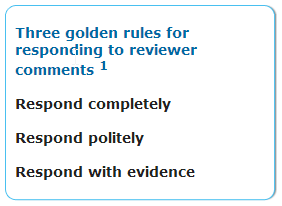How to respond to comments by peer reviewers

Once you submit your painstakingly written research paper to the journal of your choice, you will most likely be on tenterhooks for weeks or months before you hear from the journal editor about the decision on your manuscript. The journal’s verdict and the peer reviewers’ comments need not be a bitter pill to swallow if you are prepared to deal with them pragmatically.
Tips for responding to reviewer comments
As authors, you may dread receiving reviewer comments asking for major revisions. It’s daunting to rework something for which you have already taken great pains. But don’t be tempted to give up. Most often, the final outcome is worth the effort. Here are some pointers on how to respond to such comments.
1. Take a break: Initial irritation is only natural. Take time off and then read the comments again carefully and objectively to ensure that you have clearly understood the reviewers’ concerns. 
2. Give point-by-point responses: Number the reviewers’ points and respond to them sequentially. Use headings such as “Reviewer 1” then “Comment 1.” This makes it easier for the editor/reviewers to follow what you have done. It is essential to address each and every point that the peer reviewer or journal editor may have raised.
3. Provide well-reasoned arguments: If you do not agree with a reviewer’s comment, you should say so. However, do not simply state your disagreement. Provide as many details as necessary to help the reviewer understand your line of reasoning. Where possible, cite published studies to support your argument.
4. Pay attention to detail: Details are important when explaining how you have addressed each concern. For example, if a reviewer has said that you need to include/reinterpret data, you can describe the tests you performed and the results you got and mention where you have added this information. You may be considerate and even paste the exact sentences that you have added or modified in the manuscript when following a reviewer’s suggestion, since this can save the editor/reviewer the trouble of switching between files.
5. Watch your tone: Remember, the reviewers are critiquing your work, not you. Do not let your responses reflect any bitterness. If you disagree on some point, say so honestly but respectfully, and support your statement with a rational, scientific explanation, citing references from the literature for support.
6. Appreciate the reviewers’ work: Peer reviewers invest their own time in reviewing your manuscript, without pay. For the most part, their intention is to help authors improve their study. Take advantage of their advice. In fact, a long list of detailed reviewer comments usually means that reviewer has spent time evaluating your study and providing constructive feedback. Be sure to thank the reviewer for their consideration and effort.
Are peer reviewers always right?
Peer reviewers are essentially experts in their field. However, this does not mean that their comments should be taken as gospel. Evaluate each of the reviewer comment on their merits. Do not agree with a reviewer just for the sake of agreeing or with the mistaken impression that the journal editor expects you to incorporate all of the reviewers’ suggestions. At the end of the day, it is your study and reputation at stake.
You may also find yourself receiving conflicting feedback from reviewers. One reviewer may be satisfied with the methodology while another may consider it inappropriate. Minor differences of opinion are natural, but such diametrically opposite views can be perplexing. See which reviewer you agree more with and follow his/her advice, and justify your decision to the editor. Alternatively, you could request the editor to give you a third opinion. Ultimately, it is the journal editor who will make the decision on how to handle the conflict. Providing a well-reasoned argument is likely to tip the balance in your favor.
Dealing with requests for major changes
1. Word count reductions: Sometimes, your paper may be accepted for publication, but the journal editors may request you to trim your article by, say, one-third. This seemingly unreasonable request is often justified because in their endeavor to publish high-quality articles promptly, editors often face the problem of shortage of space. You will almost certainly have no choice but to comply with this request.

2. Requests for extra data or text: Reviewers may suggest various types of changes, from tweaking certain sentences to revising entire paragraphs. Occasionally, you may be asked to supply large sets of data or include more than a page of text. Provided the suggested changes are within the scope of the manuscript and you agree with them, you may wish to first consult with the journal editors to determine whether space constraints allow you to make the additions.
Conclusion
Comments from peer reviewers, more often than not, offer an excellent opportunity to improve the quality of your manuscript. Addressing them adequately may increase the chances of acceptance, if not in that journal, elsewhere at least. Armed with the detailed tips for responding to reviewer comments, you will now surely be able to handle the peer review process with more confidence.
Also read this article for some quick do's and don'ts to consider when responding to peer reviewers.
Bibliography
- Williams H.C. (2004). How to reply to peer review comments when submitting papers for publication. Journal of the American Academy of Dermatology, 51, 79–83.
- Samet J.M. (1999). Dear Author—Advice from a Retiring Editor. American Journal of Epidemiology, 150, 433–436.
How to respond to peer reviewer comments - A template_0.docx
Published on: Oct 16, 2013
Comments
You're looking to give wings to your academic career and publication journey. We like that!
Why don't we give you complete access! Create a free account and get unlimited access to all resources & a vibrant researcher community.

Subscribe to Journal Submission & Peer Review









